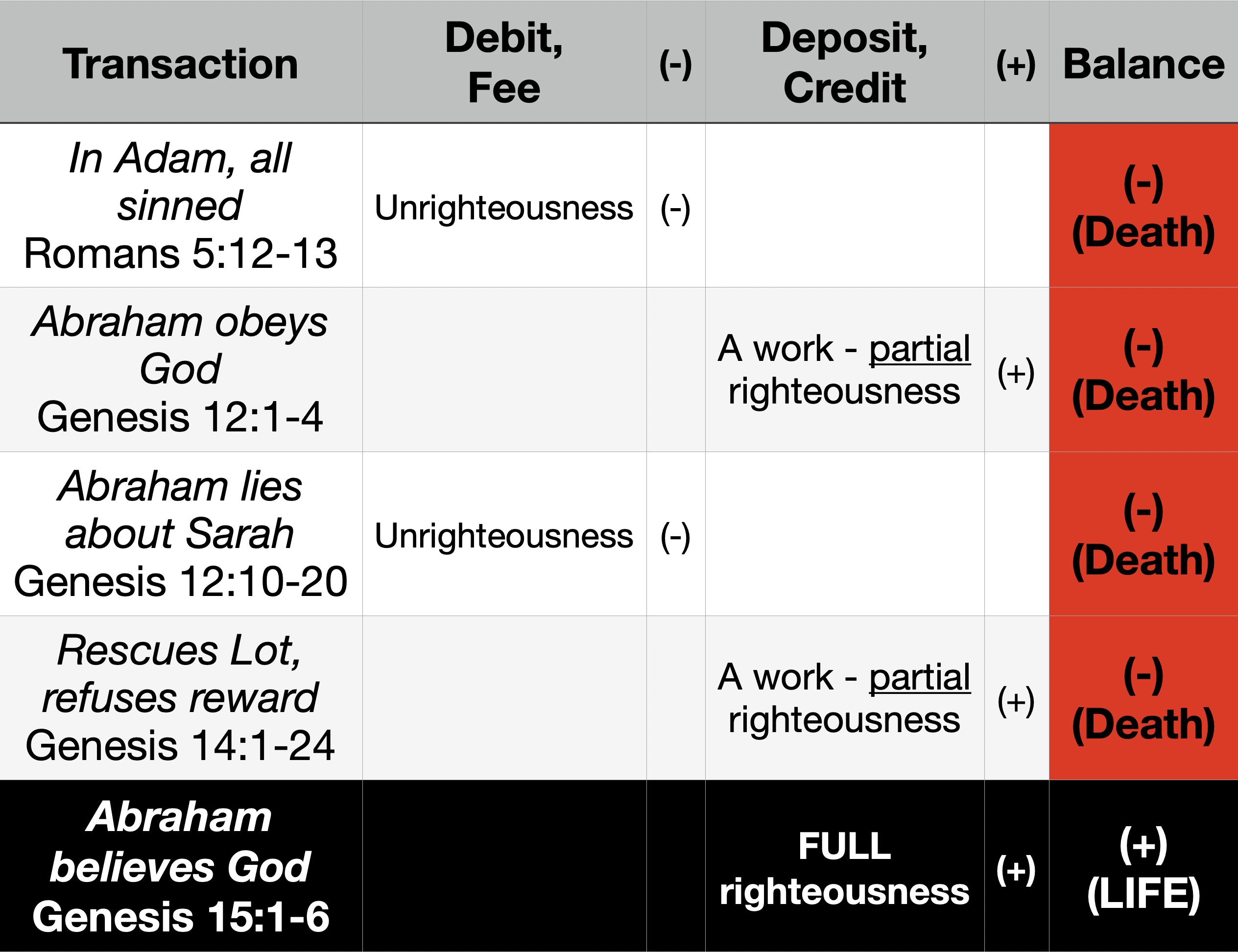Romans Bible Studyಮಾದರಿ

The Old Testament Saints Were Declared Righteous the Same Way (Romans 4)
"What does Scripture say? “Abraham believed God, and it was credited to him as righteousness.”" Romans 4:3 (NIV)
"David says the same thing when he speaks of the blessedness of the one to whom God credits righteousness apart from works." Romans 4:6 (NIV)
Context
The word translated “credited” in the NIV (“counted,” “accounted,” or “reckoned” in others) can generally mean “to think about” or “to have a certain opinion.” In business, however, this Greek word referred to a payment made in exchange for someone’s work. It is a bookkeeping or accounting metaphor.
In Romans 4, Paul uses the term as an illustration. In the metaphorical “ledger” keeping track of Abraham’s righteousness, “faith in God’s promise” was entered as a deposit that resulted in the crediting of “full righteousness” to his account. You can imagine his ledger looked something like this:

Observation
In this section, Paul uses 2 individuals from the Old Testament as examples of what it means to be credited with righteousness on the basis of faith and not works:
- Abraham - credited with righteousness because he believed God’s promise (before he was circumcised) (Romans 4:1-3, 9-12)
- David - credited with righteousness that couldn’t be cancelled out by his later sin (adultery and murder) (Romans 4:4-8)
Additionally, “promise” is a word Paul repeats throughout Romans 4:13-25. Notice the things he says about it.
Interpretation
The context for today’s passage identifies Paul’s use of a bookkeeping metaphor to illustrate how righteousness apart from works is counted. Why does he choose Abraham and David as examples of this? From the Old Testament stories, can you think of bad things they did, that the Accuser could use to argue for Abraham and David’s unrighteousness? What good things did they do, which they might try to present to the Judge as counter-evidence?
Paul, however, is adamant: God declared these men righteous based on their faith in His promise. A work couldn’t earn it and a work couldn’t take it away.
Take a second to think about what a promise is. What makes a promise? How does considering this help to make sense of the following statements:
- “If adherents of the law are to be the heirs, faith is null and promise is void” (Romans 4:14)
- “The promise depends on faith in order to rest on grace and be guaranteed to all of Abraham’s offspring” (Romans 4:16)
Application
After believing God’s promise and putting your faith in the sacrifice of Jesus, your account was credited with FULL RIGHTEOUSNESS and as a result, you will inherit eternal life. This righteousness was not attained by any “good work” you did and it can never be lost by any “sinful work” you might do. It is all based on the faithfulness of a God who keeps every promise.
Let that sink in.
ದೇವರ ವಾಕ್ಯ
About this Plan

This plan is intended as a guide to discovering the message of Romans for yourself! Grab a notebook to jot down your thoughts as you are led through a process of: (1) observing the text of Romans; (2) interpreting its original message to the church in Rome; and (3) applying the letter’s timeless truths to your own life.
More
ವೈಶಿಷ್ಟ್ಯದ ಯೋಜನೆಗಳು

A People Set Apart | Men's Devotional

Learning About Love With St. Valentine

No Flow, No Grow

Childrearing With the End in View: A 3-Day Parenting Plan

The Sound of Worship: Lessons From Revelation

Gracious Jesus 8 - the King Commissions

Shatter the Stigma

Seize the Day: A 3-Day Marriage Plan

Solitude & Silence
